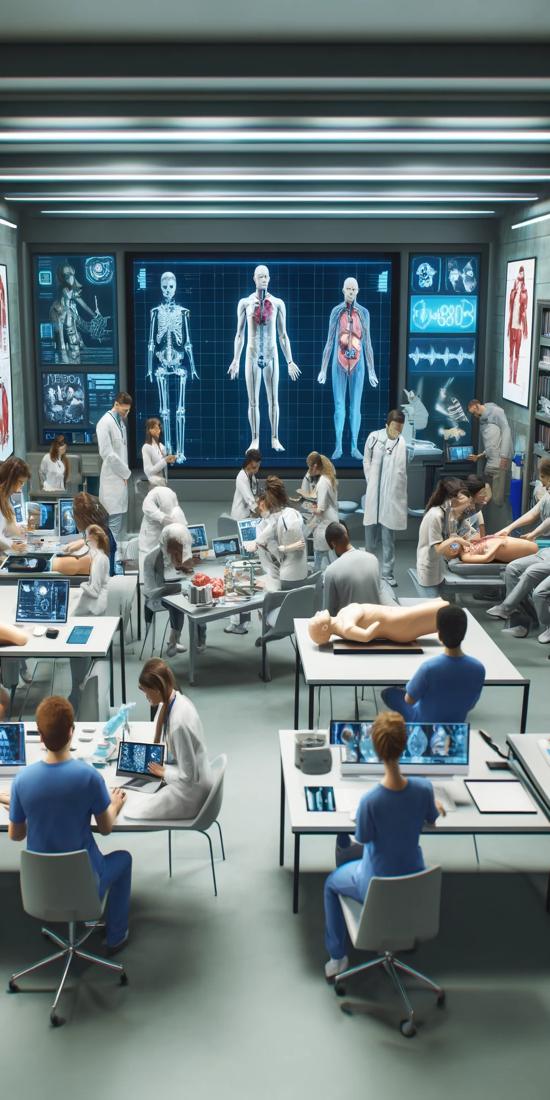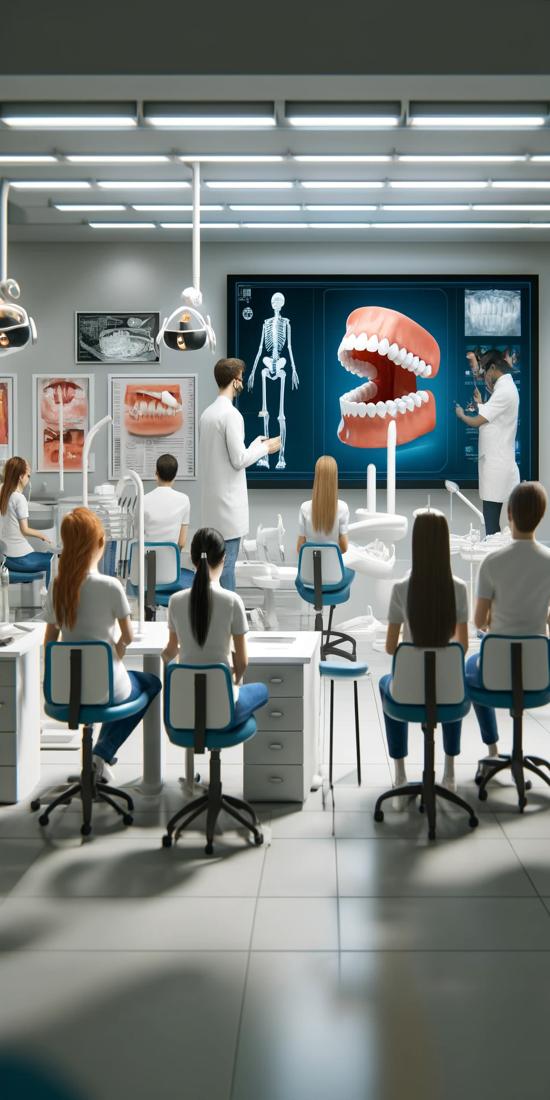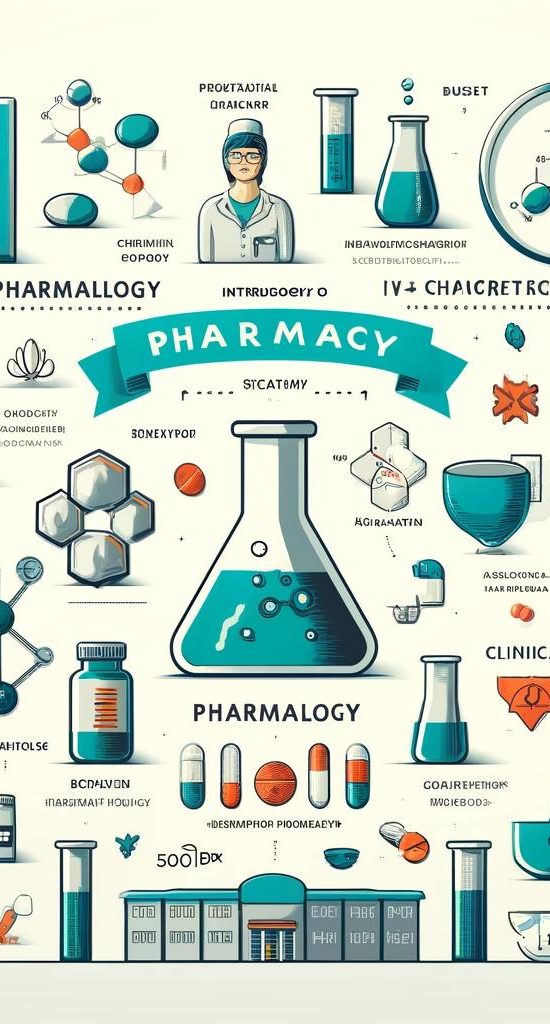
Educational Program ''Medicine''
Upon completing the program, graduates will be equipped to perform organizational, diagnostic, medical, and research functions in healthcare institutions, adhering to both national and international standards.
- Medical Biology
- Medical and Biological Physics
- Medical Informatics
- Medical Chemistry
- Bioorganic Chemistry
- Human Anatomy
- Histology, Cytology, and Embryology
- Physiology
- Biological Chemistry
- Microbiology, Virology, and Immunology
- Ukrainian Language (Professional Orientation)*
- Ukrainian Language as a Foreign Language**
- Foreign Language*
- English for Professional Purposes
- Latin Language and Medical Terminology
- Philosophy
- History and Culture of Ukraine
- Hygiene and Ecology
- Occupational Health and Safety
- Medical Psychology
- Social Medicine and Public Health
- Pediatrics
- Pediatrics with Pediatric Infections
- Surgery
- Surgery, Pediatric Surgery
- Obstetrics and Gynecology
- Neurology
- Urology
- Otorhinolaryngology
- Ophthalmology
- Psychiatry, Narcology
- Dermatology, Venereology
- Forensic Medicine
- Physical Rehabilitation and Sports Medicine
- Oncology, Radiation Medicine
- Infectious Diseases with Epidemiology
- Phthisiology
- Anesthesiology and Intensive Care
- Emergency and Urgent Medical Care
- Traumatology and Orthopedics
- Reserve Officer Training in the Field of Health Protection*
- Military Medical Training**
- Patient Care (Practical Training)
- Nursing Practice
- Clinical Practice (Hospital Departments)
- Clinical Practice (Polyclinic)
- General Practice (Family Medicine)* – for citizens of Ukraine
** – for foreign citizens
Elective Components for the 1st Year
(Student chooses 2 courses of 3 credits each and 1 course of 4 credits)
- Cultural Studies
- Jurisprudence
- Religious Studies
- Basics of Psychology
- Life Safety
- Basics of Bioethics and Biosafety
- History of Medicine
- Medical Deontology
- Molecular Biology
Elective Components for the 2nd Year
(Student chooses 2 courses of 3 credits each and 1 course of 4 credits)
- Basics of Medical Statistics
- Medical Ethics
- Logic, Formal Logic
- Contemporary Issues in Biophysics
- Cell Technologies in Medicine
- Political Science
- Advertising and Information Technologies
- Academic Integrity
- Psychology of Stress and Doping Strategy
- Ukrainian Language (Professional Orientation)**
Elective Components for the 3rd Year
(Student chooses 2 courses of 3 credits each)
- Ukrainian Language (Professional Orientation)**
- Medical Genetics
- Modern Methods of Genetic Diagnostics
- Pharmacogenetics
- Nutrition Science
- Pathophysiology of Civilization Diseases
- Phytotherapy
- Applied Aspects of Medical Cosmetology
- Basics of Electrocardiography
Elective Components for the 4th Year
(Student chooses 2 courses of 3 credits each)
- Physical Rehabilitation, Sports Medicine
- Ergotherapy and Kinesitherapy
- Basics of Clinical Laboratory Diagnostics
- Basics of Psychoanalysis
- Biomedical Aspects of Reproductology
- Vaccination Prophylaxis
- Clinical Parasitology and Tropical Medicine
- Human Reproduction
Elective Components for the 5th Year
(Student chooses 3 courses of 3 credits each)
- Gerontology and Geriatrics
- Basics of Ultrasound Diagnostics
- Current Issues in Andrology
- Basics of Transfusiology
- Neurosurgical Aspects of Cerebrovascular Pathology
- Comorbid Pathology and Modern Approaches to Its Treatment
- Palliative and Hospice Medicine
- Basics of Sexology and Sexopathology
- Occupational Diseases
Elective Components for the 6th Year
(Student chooses 2 courses from Elective Block 1 of 3 credits each and one from Elective Blocks 2-6 with a total block volume of 43 credits)
Elective Block 1
- Basics of Hematology
- Modern Endoscopic Technologies
- Age-Related Pharmacotherapy
- Manual Therapy
- The Role of Public Health in a Pandemic
- Simulation Training and Preparation for USMLE
- Plastic and Reconstructive Surgery
- Basics of Holter Monitoring
- Current Issues in Pediatric Neurology
- Current Issues in Clinical Immunology and Allergology in Children
Elective Block 2: Family Medicine
55.1. Family Medicine: Introduction to the Profession
55.2. Internal Medicine in Family Practice
55.3. Pediatrics in Family Practice
55.4. Surgery in Family Practice, including Pediatric Surgery
55.5. Obstetrics and Gynecology in Family Practice
55.6. Functional and Laboratory Diagnostics in Family Practice
55.7. Comorbid Pathology in Family Practice
55.8. Emergency Conditions in Family Practice
55.9. Simulation Training (Profile Practice)
Elective Block 3: Internal Medicine
56.1. Internal Medicine:
56.1.1. Cardiology and Rheumatology
56.1.2. Pulmonology
56.1.3. Gastroenterology
56.1.4. Nephrology
56.1.5. Emergency Conditions in Internal Medicine
56.1.6. Functional and Laboratory Diagnostics in Internal Medicine
56.2. Pediatrics
56.3. Surgery
56.4. Obstetrics and Gynecology
56.5. Simulation Training (Profile Practice)
Elective Block 4: Surgery
57.1. Surgery:
57.1.1. Cardiovascular Surgery
57.1.2. Thoraco-Abdominal Surgery
57.1.3. Pediatric Surgery
57.1.4. Endoscopic Surgery
57.1.5. Emergency Conditions in Surgery
57.1.6. Functional and Laboratory Diagnostics in Surgery
57.2. Internal Medicine
57.3. Pediatrics
57.4. Obstetrics and Gynecology
57.5. Simulation Training (Profile Practice)
Elective Block 5: Obstetrics and Gynecology
58.1. Obstetrics and Gynecology:
58.1.1. Obstetrics and Gynecology
58.1.2. Emergency Conditions in Obstetrics and Gynecology
58.1.3. Endoscopic Treatment of Diseases of the Female Reproductive System
58.1.4. Functional and Laboratory Diagnostics in Obstetrics and Gynecology
58.2. Internal Medicine
58.3. Pediatrics
58.4. Surgery
58.5. Simulation Training (Profile Practice)
Elective Block 6: Pediatrics
59.1. Pediatrics:
59.1.1. Pediatric Cardiology and Cardiac Surgery
59.1.2. Pediatric Pulmonology
59.1.3. Pediatric Gastroenterology
59.1.4. Pediatric Nephrology
59.1.5. Pediatric Infections
59.1.6. Emergency Conditions in Pediatrics
59.1.7. Functional and Laboratory Diagnostics in Pediatrics
59.2. Internal Medicine
59.3. Surgery
59.4. Obstetrics and Gynecology
59.5. Simulation Training (Profile Practice)
The ”Medicine” educational program was launched in 2018 and undergoes an annual review and modernization process according to the institute’s regulations.
All comments and suggestions are accepted via email to the educational quality expert or the program guarantor.
Educational Program ''Dentistry''
Objects of Activity: Prevention, diagnosis, treatment, and prevention of possible complications in dental practice.
Learning Objectives: To train highly specialized professionals in the field of dentistry who can comprehensively address pathological conditions using the latest methodologies.
Theoretical Content of the Subject Area: Knowledge in the field of medicine, particularly the principles and concepts of the development of tissues and organs in the maxillofacial area and their impact on the overall functioning of the body.
Methods, Techniques, Technologies, and Tools: Anamnestic, clinical, laboratory, radiological, and functional diagnostic methods according to medical care protocols; technologies for diagnosis, treatment, and prevention of dental diseases; management and organization of work in the health protection field. Graduates should possess professional knowledge and be able to carry out the diagnostic process, identify leading symptoms and syndromes, make preliminary diagnoses, conduct differential diagnostics, under the supervision of a senior doctor, formulate the final clinical diagnosis of dental diseases, understand the principles of treatment and prevention of dental diseases, and treat major dental diseases by making informed decisions based on existing algorithms.

Tools and Equipment: A graduate with a Master’s degree in specialty 221 Dentistry can use modern diagnostic, therapeutic, and other devices, items, and instruments to carry out professional activities.
The program was implemented in 2024 and undergoes an annual review and modernization process in accordance with the Institute’s regulations. All comments and suggestions are accepted via email to the quality education expert or the educational program guarantor.
- History of Ukraine and Ukrainian Culture
- Ukrainian Language (Professional Orientation)
- Philosophy
- Foreign Language (Professional Orientation)
- Latin Language and Medical Terminology
- Medical Biology
- Biological Physics and Analysis Methods; Medical Informatics
- Health Informatics
- Medical Chemistry
- Biological and Bioorganic Chemistry
- Human Anatomy
- Histology, Cytology, and Embryology
- Physiology
- Microbiology, Virology, and Immunology
- Life Safety; Fundamentals of Occupational Safety; Civil Protection
- Clinical Anatomy and Operative Surgery
- Propaedeutics of Internal Medicine
- Hygiene and Ecology
- Propaedeutics of Therapeutic Dentistry
- Propaedeutics of Orthopedic Dentistry
- Propaedeutics of Pediatric Therapeutic Dentistry
- Pathomorphology
- Pathophysiology
- Pharmacology
- Internal Medicine
- Surgery
- Social Medicine and Public Health
- Radiology
- Forensic Medicine and Medical Law
- Prevention of Dental Diseases
- Therapeutic Dentistry
- Surgical Dentistry
- Orthopedic Dentistry
- Orthodontics
- Phthisiology
- Pediatrics
- Obstetrics
- Pediatric Therapeutic Dentistry
- Pediatric Surgical Dentistry
- Emergency and Urgent Medical Care
- General Medical Training
- Otolaryngology
- Reserve Officer Training
PP.Practical Training. Patient Care. Nursing Practice
PP.Practical Medical Training
PP. Practical Dental Training
1st Year (students choose 4 elective components):
- Psychology of Communication and Conflict
- Ukraine in the System of International Relations
- Global Contemporary Issues
- History of Medicine
- Academic Integrity
- Biophysics and Medical Equipment
- Basics of Biomedical Mechanics
- Modern Issues in Molecular Biology
- Cellular Mechanisms of Structural Homeostasis
- Clinical Aspects of Human Anatomy
2nd Year (students choose 5 elective components, with at least 1 practical):
- Basics of Electrocardiography
- Clinical Biochemistry
- Microbiology of Dental Diseases
- Embryology of Oral Cavity and Teeth Organs
- Current Issues in Clinical Anatomy of the Head and Neck
- Ergonomics in Dentistry
- Dental Equipment and Materials (Practical)
- Artistic Modeling of Various Tooth Groups (Practical)
- Practical Aspects of Dental Procedures. Asepsis, Antiseptics (Practical)
- Computer Technologies in Biology and Medicine
3rd Year (students choose 5 elective components, with at least 1 practical):
- Modern Methods of Endodontic Treatment of Complications
- Modern Methods and Approaches to Professional Oral Hygiene
- Age Aspects of Dental Disease Prevention
- Dental Materials Science
- Professional Oral Hygiene. Teeth Whitening (Practical)
- Rehabilitation of Patients in Dentistry (Practical)
- Applied Genetics
- Cellular Mechanisms of Structural Homeostasis
- Clinical Aspects of Human Anatomy
- Psychology of Stress and Coping Strategies
4th Year (students choose 4 elective components, with at least 1 practical):
- Dietetics and Nutrition in Somatic Diseases
- Emergency Conditions in Dental Practice
- Acute Pancreatitis
- Modern Diagnostic Methods in Dentistry
- Modern Principles of the Diagnostic Process for Periodontal Patients
- Occlusion Characteristics in Gnathology, Orthopedic Dentistry
- Patient Management with Dental Pathologies (Practical)
- Modern Technologies in Cast Prosthetics (Practical)
- Odontoglyphic Aspects of Artistic Restoration (Practical)
- Medical Practice of Non-Drug Treatment and Instrumental Neurophysiological Studies in Non-Psychotic Mental Disorders
5th Year (students choose 5 elective components, with at least 1 practical):
- Complications of Inflammatory Diseases of the Maxillofacial Region in Children
- Modern Principles of Root Canal Preparation and Obstruction
- Aesthetic Dentistry – Smile Design
- Mastering and Justifying Adhesive Restoration and Sandwich Techniques in Dentistry
- Complications of Inflammatory Diseases of the Maxillofacial Region in Adults
- Main Aspects of the Orthopedic Protocol for Dental Implantation
- Modern Aspects of Diagnosis, Treatment, and Prevention of Periodontal and Oral Mucosa Diseases
- Surgical Preparation of the Oral Cavity for Prosthetics (Practical)
- Prosthetics and Aesthetic Restoration of Teeth Using Digital Technologies (Practical)
- Current Issues in Immunology and Allergology

Educational Program ''Pharmacy''
- Ukrainian Language (Professional Orientation)
- History of Ukraine and Ukrainian Culture
- Philosophy
- Foreign Language (Professional Orientation)
- Foreign Language
- Higher Mathematics and Statistics
- Biological Physics with Physical Methods of Analysis
- Biology with Basics of Genetics
- Human Anatomy and Physiology
- Latin Language
- Microbiology with Basics of Immunology
- Information Technologies in Pharmacy
- Pathological Physiology
- Organic Chemistry
- General and Inorganic Chemistry
- Analytical Chemistry
- Pharmaceutical Botany
- Biological Chemistry
- Computer Modeling in Pharmacy
- Hygiene in Pharmacy and Ecology
- Ethics and Deontology in Pharmacy
- Drug Technology
- Life Safety; Fundamentals of Bioethics and Biosafety
- Emergency Medicine
- Introduction to Pharmacy
- Pharmacognosy
- Pharmacotherapy with Pharmacokinetics
- Pharmacology
- Pharmaceutical Chemistry
- Physical and Colloidal Chemistry
- Pharmacoeconomics
- Resource Study of Medicinal Plants
- Organization and Economics of Pharmacy
- Clinical Pharmacy and Pharmaceutical Care
- Pharmaceutical and Medical Commodity Science
- Pharmaceutical Management and Marketing
- Toxicological and Forensic Chemistry
- Biopharmaceutics
- Quality System in Pharmacy
- Standardization of Medicinal Products
- Technology of Medicinal Cosmetics
- Pharmaceutical Biotechnology
- Social Pharmacy
- Occupational Safety and Health in the Industry
- Pharmaceutical Law and Legislation
- Drug Toxicology
- Reserve Officer Training in the Field of Health
- Practical Pharmaceutical Training in:
48.1. Drug Technology
48.2. Organization and Economics of Pharmacy
48.3. Pharmaceutical Management and Marketing
48.4. Pharmaceutical Chemistry
48.5. Pharmacognosy
48.6. Clinical Pharmacy and Pharmaceutical Care
QW. Preparation of Qualification Work
1st Year (students choose 5 elective components from the list):
- Basics of Biomedical Mechanics
- Mathematical Processing of Medical and Biological Information
- Biophysics and Medical Equipment
- History of Medicine
- The Pharmacist as a Personal Brand
- Basics of Academic Integrity
- Gender Studies
- Psychology of Communication and Conflict
- Biologically Active Inorganic Compounds
- Applied Genetics
- Modern Problems of Molecular Biology
2nd Year (students choose 5 elective components from the list):
- Professional Speech Culture
- Global Contemporary Issues
- Linguocultural Studies
- Basics of Pedagogy
- Rhetoric
- Deontology in Pharmacy
- Medical Significance of Plant Flora
- Computer Chemistry and Molecular Modeling
- Small Mechanization Tools in Drug Preparation in Pharmacies
- Theoretical Foundations of Drug Synthesis
- Physicochemical Analysis in Drug Development
- Modern Physicochemical Methods of Analysis
3rd Year (students choose 5 elective components from the list):
- Professional English
- Industrial Pharmacy
- Pathophysiology of Extreme Conditions
- Current Issues of Adverse Drug Reactions
- Mechanism of Drug Action
- Small Mechanization Tools in Drug Preparation in Pharmacies
- Theoretical Foundations of Drug Synthesis
- Working with Information Sources. International Scientometric Databases (Scopus, Web of Science, CrossRef, Index Copernicus, Google Scholar, etc.)
- Forensic Pharmacy
4th Year (students choose 5 elective components from the list):
- Pharmaceutical Aspects of Phytotherapy
- Pharmaceutical Aspects of Nutrition
- Pharmaceutical Aspects of Substance Abuse
- Ethical Issues in Pharmacotherapy
- Drug Development
- Equipment of Pharmaceutical Productions
- Toxicological Aspects of 1,4-Benzodiazepines
- Modern Phytotherapy
- Pharmaceutical Logistics: The Path of a Drug from Manufacturer to Consumer
- International Marketing in Pharmacy
- Social Interaction: Pharmacist, Doctor, Patient
- Evidence-Based Pharmacy. Evidence-Based Medicine. Clinical Protocols. Treatment Standards
5th Year (students choose 5 elective components from the list):
- Practical Training in Clinical Pharmacy and Pharmaceutical Care
- Clinical Pharmacology in Pharmacist Practice
- Pharmacological and Practical Aspects of Vaccination
- Preparation of Sterile and Aseptic Dosage Forms in Pharmacies
- Drug Production in Pharmacies
- Management and Marketing in Pharmacy Practice
- Regulatory and Legal Regulation of Pharmaceutical Activities
- Basics of Management and Marketing in Preparing a Pharmaceutical Representative
- Financial and Economic Activities of Pharmacies
- Practical Training in Pharmaceutical Analysis
- Nutrition and Bromatology
- Chemistry and Technology of Organic Drug Synthesis
- Theoretical Foundations of Dosage Forms
- Pharmaceutical Aspects of Addictive Dependence (Nicotine, Alcohol, Drugs). Polydrug Abuse. Spice. Gambling
- Legal Guardianship in Pharmacy
Я текстовий блок . Натисніть кнопку Змінити , щоб змінити цей текст . Lorem ipsum dolor sit amet, consectetur adipiscing elit. Ut elit tellus, luctus nec ullamcorper mattis, pulvinar dapibus leo.
The program was implemented in 2024 and undergoes an annual review and modernization process in accordance with the Institute’s regulations. All comments and suggestions are accepted via email to the quality education expert or the guarantor of the educational program.
Educational Program ''Higher Education Pedagogy''
Object of Study: Educational systems; educational processes in formal, non-formal, and informal education; generalized socio-pedagogical experience reflected in pedagogical theories, concepts, and contextual practices.
Subject of Study: Philosophical, general scientific, pedagogical, and psychological foundations of higher education; current issues in the technologization of the educational process, innovative activities of educators; modern approaches to organizing scientific and pedagogical research.
Theoretical Content of the Subject Area: Theories, concepts of educational and pedagogical sciences; principles of their use; pedagogical innovation.
Learning Goals: training highly qualified specialists capable of:
- Understanding the content of regulatory documents in the field of education, instructional materials in the field of expertise, licensing, and accreditation of educational activities;
- Designing, planning, organizing, analyzing, and assessing the quality of the educational process in formal and non-formal education institutions;
- Professionally applying innovative forms, methods, techniques, and technologies of teaching in practice;
- Solving current problems of pedagogical science and educational practice in professional and research activities.
Methods, Methodologies, and Technologies: Theoretical and empirical methods of scientific and pedagogical research; innovative technologies for training specialists with higher education; communicative techniques for scientific and pedagogical interaction, information and communication technologies.
Tools and Equipment: Telecommunication means, distance and interactive learning tools, global and local networks.

The program was implemented in 2024 and undergoes an annual review and modernization process in accordance with the Institute’s regulations. All comments and suggestions are accepted via email to the quality education expert or the guarantor of the educational program.
- Theory and Practice of Higher Education in Ukraine
- Planning and Organization of the Educational Process
- Didactic Systems in Higher Education
- Pedagogical Control in the Education System
- Social and Environmental Safety of Activities
- Foreign Language for Professional Purposes
- Pedagogical and Professional Psychology
- Pedagogical Mastery of the Higher Education Teacher
- Methodology of Scientific Research
- Methods of Distance Education
- Modeling of Educational and Professional Training of Specialists
- Information Technologies in Education
P1.1. Practice: Research
P1.2. Practice: Scientific-Pedagogical
Attestation
Elective Components of the Educational Program (students choose 9 components, each worth 3 credits)
- Global Experience and Trends in University Education Development
- Oratory Skills
- Psychophysical Training
- Stylistics of Business Communication and Editing
- Intellectual Property, Academic Integrity
- Sociological Research
- Pedagogical Communications
- Basics of Management and Marketing in Education
- Philosophy of Education
- Professional Ethics in Higher Education
- Systematic Approach in Higher Education
- Legal Support of the Educational Process
- Theory and Methods of Education
- Comparative Higher Education Pedagogy
- Basics of Media Literacy
REVIEW, MODERNIZATION, AND CLOSURE OF THE EDUCATIONAL PROGRAM
- Approval of higher education standards in the specialty;
- Amendments to the higher education standards in the specialty;
- Implementation of new forms of education.
Initiators of the Program review may include:
- The Academic Council and Administration;
- Program Committee;
- Methodological Council;
- Internal Quality Control Commission;
- Stakeholders;
- Student Self-Government.
The main indicators for reviewing the educational program are:
- Results of the assessment of the program content in the context of recent research;
- Consideration of societal needs;
- Results of the evaluation of students’ academic workload, achievements, and program completion;
- Results of the expectations, needs, and satisfaction of students regarding the educational program;
- Results of the expectations, needs, and satisfaction of stakeholders regarding the Educational Program;
- Evaluation results of the educational environment and educational support services, and their alignment with the program goals;
- Improvement of student competencies;
- Increase in mobility programs;
- Availability of “continuous education” programs developed in collaboration with employers;
- Availability of certified additional education programs.
The training program may be updated annually in terms of structural components, including content outlines of educational components, changes in academic workload, teaching methods, etc.
The Educational Program is updated by approving the relevant changes before the start of the new academic year.
ЯIf it is necessary to review the training program, its educational components, the amount of ECTS credits, etc., to achieve the mission of the Institute and specific learning outcomes of the program, the Training Program is subject to modernization.
The closure of the educational program is carried out under the following circumstances:
- On the initiative of the Administration and/or the Academic Council of the Institute;
- On the initiative of the Institute’s management (at the request of the admission committee) if there are no applicants for this training program for 2 years;
- On the initiative of the Administration and/or the Academic Council of the Institute at the request of the program committee or internal quality assurance commission.
- In case of a fundamental modernization (reformatting) of the Training Program, including through the merging or separation of an existing IP at the Institute, the modernized Training Program is formed and approved as a new one, and for those educational programs that were implemented before the modernization (reformatting), the admission of new students ends. After the completion of the training of the last batch of higher education students in the final year, the training program is removed from the list of educational programs implemented at the Institute.
The decision to close the Educational Program is made by the Academic Council of the Institute.

